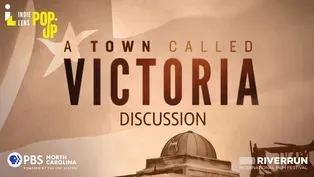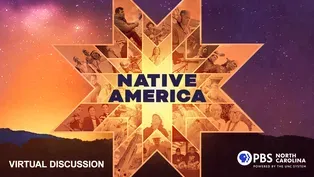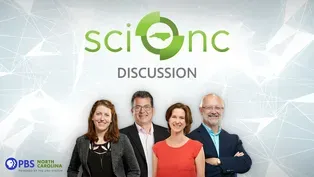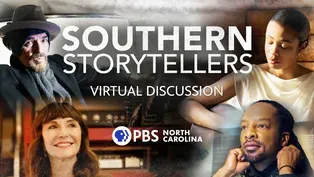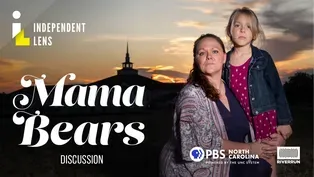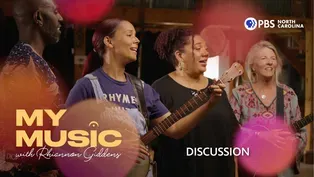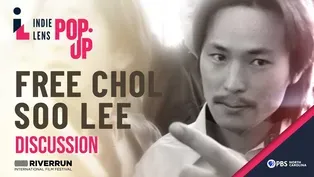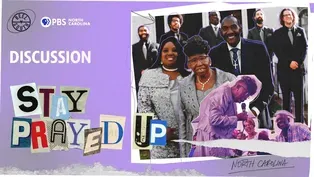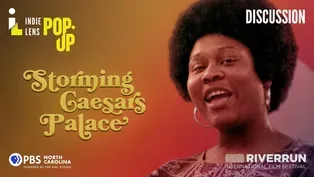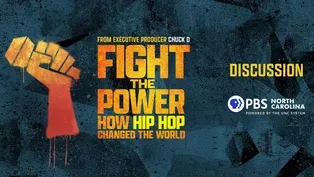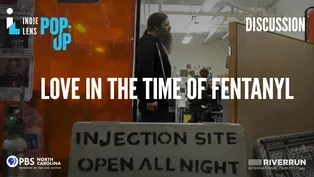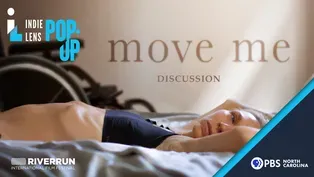PBS North Carolina Specials
Discussion | Finding Your Roots Season 7 Preview
1/14/2021 | 34m 20sVideo has Closed Captions
Panelists discuss starting your own genealogy investigations.
Following a preview of Finding Your Roots season 7, Deborah Holt Noel leads a conversation on how to start an investigation into your own genealogy and family heritage, where to find free, local resources and how families react to discoveries. Our panelists are Laurel Sanders, NC Genealogical Society and Sarah Koonts, North Carolina Department of Natural and Cultural Resources.
PBS North Carolina Specials
Discussion | Finding Your Roots Season 7 Preview
1/14/2021 | 34m 20sVideo has Closed Captions
Following a preview of Finding Your Roots season 7, Deborah Holt Noel leads a conversation on how to start an investigation into your own genealogy and family heritage, where to find free, local resources and how families react to discoveries. Our panelists are Laurel Sanders, NC Genealogical Society and Sarah Koonts, North Carolina Department of Natural and Cultural Resources.
How to Watch PBS North Carolina Specials
PBS North Carolina Specials is available to stream on pbs.org and the free PBS App, available on iPhone, Apple TV, Android TV, Android smartphones, Amazon Fire TV, Amazon Fire Tablet, Roku, Samsung Smart TV, and Vizio.
Providing Support for PBS.org
Learn Moreabout PBS online sponsorshipMore from This Collection
Discussion - A Town Called Victoria - Independent Lens
Video has Closed Captions
The filmmaker and former Victoria residents share their story. (46m 51s)
Discussion - Native America Season 2
Video has Closed Captions
Panelists discuss preserving the languages of Native American tribes. (39m 1s)
Video has Closed Captions
Sci NC executive producer and host, Frank Graff, chats about upcoming Season 6 of Sci NC. (26m 6s)
Discussion - Southern Storytellers
Video has Closed Captions
Author David Joy and others discuss storytelling and their new PBS series. (42m 13s)
Discussion - Mama Bears | Independent Lens
Video has Closed Captions
Producer and director Daresha Kyi discusses the film and LGBTQIA+ advocacy. (34m 41s)
Discussion - My Music with Rhiannon Giddens
Video has Closed Captions
Discussing the series with producers Will & Deni McIntyre and country artist Rissi Palmer. (39m 56s)
Discussion - Free Chol Soo Lee | Independent Lens
Video has Closed Captions
Local lawyers, professors and nonprofit leaders discuss wrongful convictions and reentry. (40m 44s)
Discussion - Stay Prayed Up, Reel South
Video has Closed Captions
The filmmakers discuss their journey with Mother Perry and The Branchettes. (45m 4s)
Discussion - Storming Caesars Palace | Independent Lens
Video has Closed Captions
Local professors and nonprofit leaders discuss welfare and the social safety net. (33m 2s)
Discussion - Fight the Power: How Hip Hop Changed the World
Video has Closed Captions
Local experts discuss the history of hip hop with PBS North Carolina. (59m 43s)
Discussion - Love in the Time of Fentanyl | Independent Lens
Video has Closed Captions
Local harm reductionists, therapists and others discuss the opioid crisis and more. (55m 44s)
Discussion | Independent Lens: Move Me
Video has Closed Captions
A dancer with blindness and disability advocates discuss adaptable arts programs. (38m 46s)
Providing Support for PBS.org
Learn Moreabout PBS online sponsorship- Hello, everyone.
I am Deborah Holt Noel of PBS North Carolina, formerly UNC-TV, a brand new name, same great public media station.
And on behalf of your statewide public broadcasting network, I am very proud to present to you this evening, which is a preview screening of the upcoming season seven from this fan favorite and critically acclaimed PBS program, "Finding Your Roots" with Henry Louis Gates Jr.
I'm even more excited to give you the opportunity to engage with our esteemed panel, which is three dynamic, smart and fantastic women.
You might've noticed a change this week.
UNC-TV is now PBS North Carolina.
We proudly present content that connects us to our roots as North Carolinians, as Southerners and as Americans.
So once again, I am proud to be with you tonight representing one of the nation's largest PBS affiliates.
Thank you for joining us and for your support of PBS North Carolina now more than ever.
As a special treat for your participation in this evening's event, "Finding Your Roots" and with grant funds provided by WETA, we are giving away ten one year digital memberships to the North Carolina Genealogy Society and Reference Guides.
If you want to enter for a chance to win, please send an email to events@pbsnc.org with Roots in the subject line.
10 winners will be selected randomly, and winners will be notified via email.
Now with that, I would like to welcome our special guests for this evening.
I am excited to be joined by Laurel Sanders, who's the president of the North Carolina Genealogical Society, Sarah Koonts, a state archivist with the North Carolina Department of Natural and Cultural Resources, Jewel Ausby Lowe an amateur genealogist who's gonna share with us her own personal journey to discover more about her own heritage.
So I am so excited and we certainly are gonna be taking your questions as well.
And what we're gonna do is just go ahead and open with our panelists.
First, Laurel, can you tell us a little bit about your organization, the North Carolina Genealogy Department, what it does and how it helps everyday folks with little to no research experience trace their family tree.
- Hi, Deborah.
Thanks so much for having me on the panel this evening.
The North Carolina Genealogical Society has been active since 1974.
And one of our best resources is the journal that we publish quarterly, which is approximately 100 pages of very little known records throughout the State of North Carolina.
And this journal is searchable on our website and for members, the journal comes to you either in digital form or in printed form four times a year.
We have over 346,000 names in our journal searchable online index.
So it's a really a tremendous resource for people who are doing North Carolina research.
We also have a webinar library with over 32 webinars, all about doing genealogy research with a special emphasis on North Carolina, because that is really where our niche is in helping people who are doing research here in our state.
We also hold educational events during the year and have a monthly newsletter that's free for anybody that's interested.
We have some members only resources on our website as well.
So anyone that's interested in genealogy or specifically North Carolina genealogy, I'd encourage you to visit our website at ncgenealogy.org and see what you can find.
- Terrific.
Thank you so much, Laurel.
And now I want to go to Sarah.
Sarah, you're a state archivist.
Exactly, what do you do?
What's your role?
- So the State Archives is part of the Department of Natural and Cultural Resources.
And our mandate is to collect, preserve and make accessible the documentary heritage of the state that is prominently valuable.
So that comes primarily from government records.
So we collect and preserve and make government records available from all the counties and from state agencies and boards and commissions.
And we're also very fortunate that we're able to collect records from private donations as well.
And that can come in the form of diaries.
We have a great audio visual collection, including home movies and motion pictures and still images, organizational records.
And we also do a lot of collecting in our military history about North Carolinians.
That's the bulk of our collection.
- Terrific.
And Jewel, can you tell us a little bit about where you got started with researching your own history?
Where did you even begin?
- Well, for me, it was just a little document that I received at a family reunion one year that had a list of my great grandfather's brothers and sisters.
And from that curiosity as to who these people were, what role did they play in my grandfather's life, and so I wanted to know more.
And from that, I started talking to family members, gathering information from them, which I will tell anyone when they start that's where to start, you gathering your information from people that are older and still alive.
If you can write it down, write it down, special record that information.
If you can video record it, tape record it, however you choose to.
It will be vital in your search as you begin and probably as you continue on, you'll refer back to that information.
So to me giving face to face, person to person information is the best way to start.
- And how long have you been researching?
- Over 24 years.
I started simply because I was pregnant with my first child and I wanted her to have a foundation of where she came from, to know who she was, where our family resided and how we got here and all that good stuff.
And that curiosity just continues on 24 years later.
- Wow.
Well, that's fantastic.
And we watch "Finding Your Roots" and get so excited about this research and then we might think to ourselves, "Hey, I don't have a lot of money, which I would imagine that they have with finding your roots."
In fact, when we did a similar conversation about a year ago, we discovered that they might spend upwards of $60,000 per person to do the research for finding your roots but people will probably don't have that amount of budget.
So Laurel, I wanted to ask you what kind of costs might be involved in doing this research and then talk a little bit more about some of the free resources that are available.
- Well, it can get very expensive.
But there are ways that you can do some of the research without having to spend a lot of money.
Let me give you a few good places to begin.
And first of all, let me second, what Jewel said because starting with what you know, starting with yourself, your parents, your grandparents that is definitely where you want to begin.
When you begin to want some additional records, some of the places that you should look are your local library.
Of course, everybody knows about Ancestry.com.
We see them advertised all over the place and an Ancestry.com subscription is fairly expensive.
But what a lot of people don't know is that many local libraries give you free access to an Ancestry.com library program which allows you to do a lot of the research that the paid subscription allows you to do.
And so that's someplace to start.
Libraries also have some other online resources that if you have a library card, you can access at the library.
And in some cases, if you have a library card, they'll even let you log on from home and access those free resources.
So that's one place to check.
The National Archives has some tremendous resources that are available free online.
And not only that, but they have some excellent information about how to get started in genealogy.
So I would definitely recommend the National Archives website, as well as the digital resources available through our state and local websites.
Tremendous collections are available freely online through those websites.
There is a website called Cyndi's List, which has been around for a very long time.
You can Google it.
It has thousands and thousands of resources, how to get started, how to keep records, where to go, what websites are available for getting information.
It's just a tremendous resource.
Another one that a lot of people don't know about and don't utilize is called familysearch.org and FamilySearch has many of the same records that Ancestry has, but it's all free.
You do have to give your name and your email address and have a password so that you have an account, but it's completely free.
Lots and lots of records are available there including many, many North Carolina State records.
In fact, some of the microfilms from our state archives are available through FamilySearch and you can do all that searching from home.
So that's really a terrific resource.
And then of course, there are places like the National Genealogical Society that have some things available online at low or no cost.
And I always recommend to people to check out the local genealogy society and the local library for the areas you're researching because they have a tremendous amount of information that's either free or very low cost to you.
- Terrific.
And we've got folks out there in the OB who are asking lots and lots of questions.
So I'm gonna get one of those in.
We've got a question that asks, "I know a lot about my grandparents, except one my paternal grandmother who married my English grandfather in port Elizabeth, South Africa in 1900.
I'm guessing she was born in South Africa but cannot find out anything about her or her family.
Do you have any advice?"
- Do you want me to take that one?
[laughs] - Why don't you take that one, Laurel?
- I am not going to tell you that I'm any sort of expert on South African records and South African genealogy.
The first thing I would do is I would start Googling that and I would also look for a Facebook group.
Facebook has just exploded for genealogy help.
And I would definitely go to Facebook and see if there are any Facebook groups available.
And the other thing is, again, I have go back to FamilySearch because FamilySearch collects records from all over the world.
And I would definitely look at FamilySearch and see if they have anything available for records from that area 'cause it's very possible that they may have some collections that would be helpful.
- I was gonna ask Sarah too, as far as the resources that are available to the public, can someone just come in to your office and start searching a birth certificate?
Where does security fall with that?
- Well, we certainly have a lot of records that fall into those vital records category, although birth certificates are ones that remained with our vital records in the county.
So those aren't ones you can get with us, but you can get death certificates from us as well as FamilySearch.
And that's a great way to do it remotely.
Our search room is open to the public.
Right now during COVID times, we do ask you to make an appointment 'cause we're limiting the number of people that come in, but we absolutely welcome you to come in, talk to the staff.
Another part of our agency is the Genealogy Library as part of the State Library, the Government and Heritage Library, which is the floor below us and they have a lot of printed resources, abstracts and things that compliment our original records.
So our department is really a good place to come and speak to the librarian, speak to the archivists to get started, get some advice on what records might be helpful to your search - And Jewel, when you began to do all of your research, were you inhibited at all at the beginning and now you're like an expert or was there a place that you found that was particularly insightful?
- Well, when I started the internet, as far as genealogy was concerned, I'm not going to say nonexistent, but it was very small.
A Family Tree Maker, I don't know if anybody heard of that, that was out at that time.
And so the information I was able to gather online was very limited.
So fortunately, I only live an hour and a half away from the family line that I'm researching.
So I was able to actually go to their records building and ask for information and they were very helpful there as well.
And the local library there as well, assisted me in getting a lot of information that otherwise I would not have been able to gather on my own.
And then after that years, then Ancestry.com came on and then I was able to use that resource to get my information.
The Latter-day Saints, I think they had their website up as well.
I was able to use a lot of that information.
So for me, it was a trial and error for me.
I didn't take the time actually to learn how to do it, I just jumped right in.
And normally that's what people do when they want to find their family.
They don't know what to do so they just jump right in.
But I will suggest what Laurel says, what Sarah says to just take the time and do a little, just research for yourself so it's not so overwhelming as you begin your search - Deborah, could I add that we also have two remote facilities on either side of the state?
So people that are at the coast are welcome to visit the Outer Banks History Center in Manteo and the Western Regional Archives is in Asheville.
So if you're closer to those facilities, do start there and talk to the staff in those locations.
- Oh, that's great advice.
Thank you so much, Sarah.
And here's an interesting question about finding documentation for a female grandmother who may have been native American.
And this viewer wants to know since for so many years people did not admit to or tried to hide their native American ancestry so there's sort of a missing link.
Any clues as to how to research a female native American?
Laurel.
- I'm gonna ask Sarah about that because I think they have some records there, at least for North Carolina, that might be helpful.
- I would recommend a good first place to start would be with that native affiliation 'cause it does vary from group to group in terms of records.
So for example, I know with the Cherokee, they keep roles for their members and they would be a good place to start.
But sort of speaking to what Jewel was saying about talking to your family members, if you have the understanding that you have an ancestor from a particular group of native Americans, I probably would start with them first to see what kind of resources they have.
A lot of what they do for their affiliation with their groups involves a lot of the same techniques.
So it's basic genealogy and the same types of records that the people use to show family relationships, obviously.
So I think I might start there and then certainly come to the State Archives and see what records that we have that might be from a particular area that would be helpful in your research like for that county or that region.
- Right.
And we have a question asking about how far back can you expect to be able to go with birth certificates and death certificates.
About how far back?
- Yeah.
Birth certificates and death certificates were kinda late to the game in North Carolina.
So 1913 is when they start.
So you're gonna need to find alternative sources for that kind of information.
And that can really vary.
And I suggest that people be creative and Laurel might might second that as would Jewel.
To find that information, you often can find information like that in wills, estates.
Certainly, we're talking about someone's death but then the census records and you might find it located in other places.
Sometimes our role records will give a comment that this piece of property where someone died last year or there might be internal clues written in documents so sort of leave no stone unturned for that knowledge.
- Yeah.
I'll second what Sarah says on that.
Sometimes you have to get very creative and you have to learn how to do math.
[laughs] There's a lot of math involved, subtracting and also seriously, the law is very important because there are points in the law which tell you at what point someone would have been, had to have been 18 in order to do this or they had to be 21 in order to sign this type of document or participate in this sort of event.
And so there is an element that studying about your history and your law for the places where you're doing your research can really come into play and can help you resolve some of those.
- And for me, I would tell anyone to actually look at the census records, because when you go to some of the sites, they'll give you names and they'll give you birth years and age but you need to actually open that document up because in some of it, sometimes it will say a widow, widower, or however that's written then and then you'll actually be able to know then you can do the subtraction, as Laurel said, to determine when that person died based on the census records.
- And I was gonna ask you, Jewel, to share a little bit about anything that you might've discovered in your research that was either shocking or emotional or sad that you would be willing to share with us.
- I think for me, actually identifying, you look at the names for so long and then you actually know history and what took place in my family's life and how they had to deal with a lot of things as slaves.
and then African-Americans.
It's heart-wrenching to know that that story had to take place, it did take place.
And then my dad, he took me and my family a couple of years to his hometown and gave us a tour.
And then you're able to actually see visually what was written on paper.
It's very heart-wrenching to hear the story being told as you know it was written and to know the struggle that a lot of my family members went through in the South here, in Halifax County, that's where they're from, North Carolina and what they had to endure.
And a lot of them did have to do what they had to do.
I mean, they took in family members and farming was the most important thing that they had for themselves.
And they all had to do it on the other side of the track.
So it's a lot to take in.
It does become overwhelming, but you do have to understand that this is a story that is your foundation and it gives you something to stand on and to feel like you are a part of history.
Like I said before, even though I'm not in the history books, my family name is not in the history book, I am part of the history of North Carolina and it does feel good to know that information.
- I'm gonna let you talk a little bit later about managing some of the discoveries which can be emotional for people, but I'd also want to talk about confidentiality and Laurel and Sarah, maybe you can weigh in.
People are going through and they have different motivations, I would imagine, for learning about their history.
Where's the confidentiality with regard to asking for assistance to find out more about your relatives?
- Well, genealogy and family history research has always been a collaborative effort.
And before we had computers and before we were doing things online, people would write to their distant relatives and they would say, "Can you give me the birth dates and the death dates and the information about all the people in your family?"
And I have books of these papers that people typed out on typewriters with the old blue copy paper in between the pages.
And it's always been somewhat collaborative.
And we are all related in some way, shape or form.
If you go back far enough, really, truly, we are all related somehow.
And so that information to me is really meant to be shared as much as possible.
But on the other hand, every family will find something in their history that is uncomfortable and that you have to come to grips with.
And I find the best way to handle that is to really just be honest and open and talk about it within your family and try to understand the context in which that particular event that's uncomfortable occurred because the context changes over time and the way we feel about things today may not have been the way they felt about things back then.
And so you do have to think about the context and the history but I think the best course is always to be open, to share the information freely, and to use that information to spark conversations.
- Good advice.
And we have a question out here about someone who's adopted and the difficulty of finding records when you are adopted and the emotional difficulty of dealing with folks who may not want to share additional information.
Any advice for people who are adopted, or have you worked with anyone who was adopted and was trying to do some research?
Sarah or Laurel.
- Sarah, do you want to talk a little bit about adoption- - Sure.
- Record?
- Right.
We certainly have dealt with people who've come in and are looking for adoptions.
Those records only become open after they're 100 years old.
Now in North Carolina, that's been a change in the last few years in opening up some statutes 'cause they had been closed and closed forever.
And that does present a little bit of a difficulty 'cause as Laurel said, there's family conversations that can be difficult and need to be treated with respect.
I have an adopted sibling myself so I'm very familiar with a lot of those issues.
I think that's something that just you have to treat with caution because I know that people go online with a lot of DNA analysis and then approach someone that they think might be related.
So I just caution people to do that with care and respect about the family story.
But certainly, if you are, I'm trying to think of the right way to put this, that you just kind of have to look into the statute of the state where the adoption took place to understand what might apply and how far you can get for more modern records.
But certainly we're pleased that those that are older now can be opened and examined.
- And I will say, we didn't have DNA until fairly recently, but DNA has opened up a whole world for people who are adopted and also for people who didn't realize that their biological parents or grandparents or great-grandparents weren't who they thought they were.
And so sometimes that is great information to learn and sometimes it's not so great.
But if you are trying to figure that out, there are people that will help you.
And sometimes they're referred to as Search Angels.
And again, I would go to the internet and I would go to Facebook and look at people who help adoptees or help people who are searching for their biological parents because there are people that will do this for free in some cases.
And there is some really good advice out there.
And there's some really excellent classes that you can take about how to use DNA to help you find that out.
I would say virtually, every family, if you go far enough back, you're gonna find an event in parentage that's not what you expect.
The statistics just show that it's really much more common than what we think.
In my own family, as an example, the line that I have been researching that I descend from, I did a DNA test with my uncle a number of years ago, and it looks like we may, in fact, some many years ago have actually had a different paternal line than the one that I'm researching or that I thought I was researching.
Those things happened more commonly than what you would think.
So it's not surprising, but there are people out there that can help with that kind of thing.
And here's sort of a fun circumstance from one of the viewers.
They ask, "My paternal grandfather had a common surname.
It was the name of his plantation owner.
However, there's so many individuals with that last name.
I'm stuck.
Any suggestions."
- That is really hard and very, very common.
[laughs] Yes.
That's very, very difficult to sort out.
That is where you really have to learn the nitty gritty of doing genealogy research.
And you may in fact, end up wanting to hire a professional researcher to help you sort that out.
It can be extremely difficult to sort out people when you have two or three people with the same name.
- And that's often an opportunity, I hate to say this, but you need to learn about everybody with that same surname in the area and place them in context so you know who's who and who doesn't belong to your direct line.
So it sort of opens up a little bit of extra research if you have that situation.
- We talk a lot about the fan club in genealogy research.
The fan club is the friends, associates, and neighbors of the person that you're researching.
So that's a good place always to start when you're stuck somewhere, is to look at all the records for that person and write down the names of all the people that they did business with, that they lived next to, that they were on marriage records or deed records with, make note of those names and then use that as a clue when you're looking to sort out people with the same name.
- Jewel, I want to ask you, if you can share a little bit about who you are and what you've discovered.
Where's your family from?
How far can you go back?
And is there any relative that you've discovered who's got a particularly interesting story?
- Well, as far back that I can or have gone is 1830 and that was my third great-grandfather, and his name was Geo.
And I'm still trying to figure out how far or where he went.
But he was owned by a man named Thomas Ousby, O-U-S-B-Y.
And when Thomas died, he heired his slaves to his children.
And so there was like four or five of them altogether.
So my family was basically split up between these four children.
And then as time went on, which the viewer had mentioned, well, with the last name, Ousby, O-U-S-B-Y, it is a unique name but they were a lot of slaves that were owned.
And so to figure out exactly what slave was my family member is the difficult part for me because a lot of them were sold as well.
So to track that and to actually know if they were family members is where I'm at at this point.
But as the years went on, losing a few of them in the census because a lot of them were destroyed in the 1890 census and partial of the 1900 census that were destroyed in the fire, I lose track of some family.
So then I had to basically restart my research all over again.
But I've been able fortunately to get the information from family, tracked some down that moved to Virginia, to Merlin, to New York area, some to Florida, California, Alabama, Texas.
[laughs] So they went all over the place with that last name.
And as Laurel said, sometimes it is difficult because even if they have that name, that does not necessarily mean that they are blood related.
But as far as stories are concerned, I think for me it's the story of Edmond, my great-grandfather and all that he did for his children, I think there was total 12 altogether and what he did not have to sustain his family, he made sustainable for his family.
And it shows in the kids and my and my aunts and uncles.
And this is where I tell people, when you do your history, you're able to find out why people are the way that they are.
Some stories will never be told because it's too hurtful and it shows in how they act or how they respond to family members.
And to me, it's helped me to understand my family a whole lot better and to be able to accept their stories as something that is maybe hard for them and let it be.
It's a beautiful thing just to be able to know that we all come from the same line but we all have dealt with our family challenges differently.
- Yeah.
- And so that's why I tell my kids just to know your foundation and know how to deal with people.
You don't know what their story is 'cause sometimes they don't even know what their story is.
- That's true.
- But be kind 'cause we also have struggled a lot in this country.
So it is good to have that foundation of knowledge if you can get it.
- Absolutely.
Wow.
That is a great message to kind of leave on.
This has been a great conversation, terrific information.
Thank you so much to our wonderful panelists, Laurel Sanders and Sarah Koonts for joining us and sharing their tools of the trade and resources so we can all find our own roots.
And Jewel, thank you so much for sharing your personal story and journey with us.
Thank you to everyone that tuned in.
Please let your family, friends and neighbors know about the exciting new season of "Finding Your Roots", premiering on Tuesday, January 19th at 8:00 PM on PBS North Carolina, your local PBS station or on the PBS streaming app.
A special thank you to our event partners, The North Carolina Genealogy Society and North Carolina Department of Natural and Cultural Resources.
And don't forget if you wish to enter the giveaway for a one-year digital membership to the North Carolina Genealogy Society and Reference Guide, please send an email to events@pbsnc.org with Roots in the subject line.
10 winners will be selected at random and winners will be notified via email.
This giveaway and event were made possible with grant funds from WETA.
Please be on the lookout for an email within the next two weeks or rather within the next week for a recording of this discussion, additional resource links and an audience survey.
We appreciate your feedback.
So please take time to do the survey.
We welcome your comments.
And with that, I'd like to leave you with a reminder to join us every week for North Carolina Weekend, as well as Black Issues Forum.
And once again, thank you so much for tuning in for this screening of the program and for sticking around for the conversation and submitting so many terrific questions.
Everyone be safe and have a good night.
